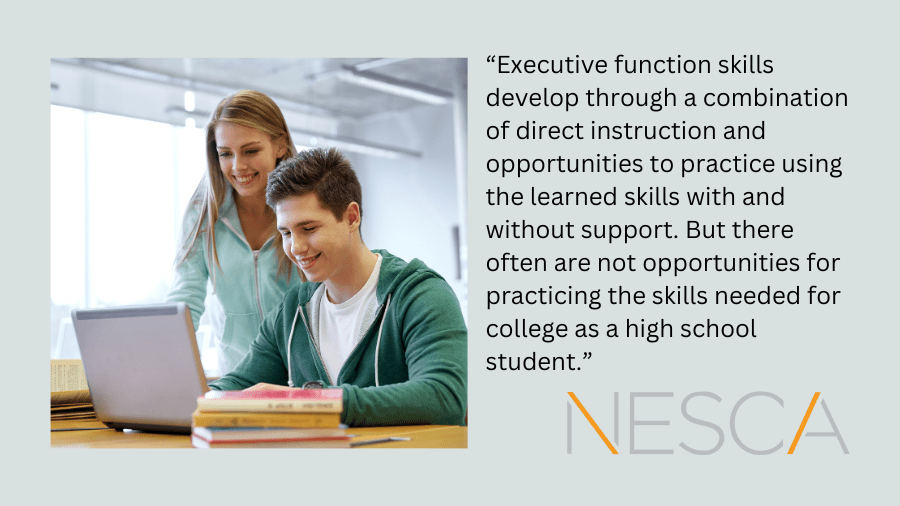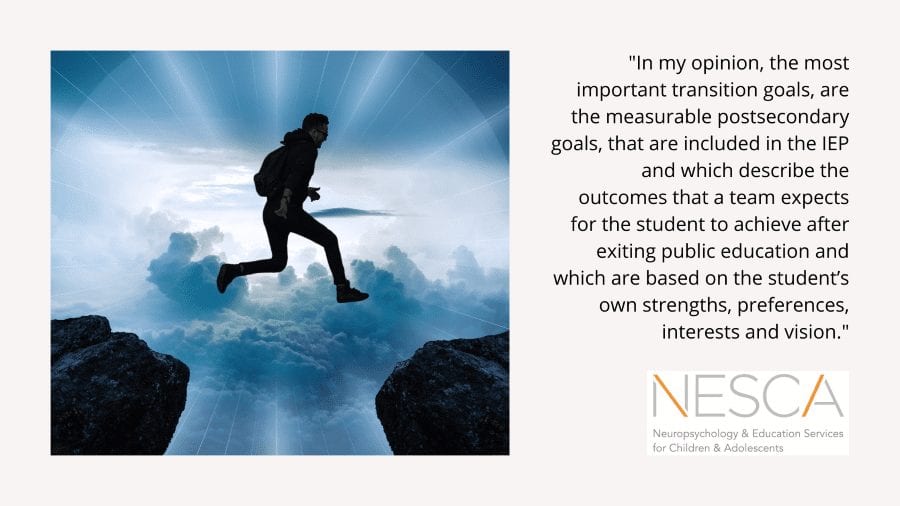
 By: Sarah LaFerriere, M.Ed.
By: Sarah LaFerriere, M.Ed.
Transition Specialist & Special Educator, NESCA
Supporting students with disabilities is an experience filled with opportunities to help them grow and succeed. One key area to focus on is promoting independence, which involves carefully managing the use of prompts. If not handled well, prompt dependence can become a significant barrier, especially as students move toward transition age.
What is Prompt Dependence?
Prompt dependence happens when students become overly reliant on external cues, like verbal or written instructions or physical guidance – from teachers, therapists, or caregivers. While prompts are a helpful tool in teaching, over time, too much reliance on them can make it difficult for students to act independently. This can become a bigger issue as they get older and need to function more independently in real-world situations, such as in jobs or community settings.
Why Fading Prompts Matters and How to Do It
Fading prompts is a technique used to gradually decrease the level of support given to students, helping them gain the skills they need to act independently. The goal is to provide enough support initially so that students can learn, and then slowly reduce that support as they become more capable on their own. This isn’t about suddenly withdrawing help but rather about making a gradual shift that encourages students to rely on their own skills.
- Start Early—Addressing prompt dependence early on is crucial. When introducing prompts, consider how you’ll gradually reduce them. For younger students, this could mean starting with more hands-on assistance and gradually moving to less direct forms of support, such as verbal or visual cues.
- Reduce Support Gradually—Fading prompts involves a step-by-step reduction of assistance. Begin with more direct prompts and, as the student improves, shift to more subtle forms of support. It’s important to pace this reduction based on the student’s progress, ensuring they have enough opportunity to practice and succeed before making further changes.
- Promote Self-awareness—Encouraging students to recognize when they need help and how to seek it can be very effective. By developing self-monitoring skills, students can learn to manage their own needs and understand when they are capable of performing tasks on their own.
- Be Consistent and Patient—Consistency among all those involved in a student’s education is key. This means that teachers, therapists, and family members should use the same approach and follow the same plan for reducing prompts. Patience is also important, as progress can be gradual and may require repeated practice.
- Customize Approaches—Every student is different, and so their path to independence will be unique. Tailoring the approach to each student’s specific needs can make a big difference. This might involve adjusting how quickly prompts are faded or choosing the types of support that work best for the student. Regularly reviewing and adjusting the plan ensures that students are receiving the right level of support.
Involving Families and Service Providers
Families and service providers are essential in this process. Good communication and teamwork between educators, therapists, and families help create a consistent approach to fading prompts. Families can support the skills being taught in various settings, and service providers can offer valuable insights and guidance.
Preparing for the Future
As students reach transition age, being able to act independently becomes even more important. By addressing prompt dependence early and using effective fading techniques, we can help students develop the skills and confidence they need for adult life. This preparation not only aids students but also benefits their families and communities by fostering a more inclusive environment.
In summary, fading prompts is a crucial practice in helping students with disabilities become more independent. By understanding and applying strategies to reduce prompt dependence, we can better prepare students for a future where they can navigate the world with confidence and self-sufficiency. This not only supports the students but also contributes to a more supportive and inclusive community.
About the Author
Sarah LaFerriere, M.Ed., is a transition specialist and special educator who has nearly a decade of experience working with transition aged students in public schools, college, and home-based settings. She provides transition assessment, consultation, and coaching services to a wide range of clients, and specializes in supporting students with autism, intellectual disabilities, developmental disabilities, mental health conditions, and medical conditions.
To book a consultation with Sarah LaFerriere or one of our many other expert transition specialists, neuropsychologists, or other clinicians, complete NESCA’s online intake form.
NESCA is a pediatric neuropsychology practice and integrative treatment center with offices in Newton, Plainville, and Hingham, Massachusetts; Londonderry, New Hampshire; the greater Burlington, Vermont region; and Brooklyn, New York (coaching services only) serving clients from infancy through young adulthood and their families. For more information, please email info@nesca-newton.com or call 617-658-9800.




 By:
By: 





 By:
By: 
 meaningful skills in order to reach their goals. She has spent the majority of her career working in a private school for students with ASD. She has also spent some time working in an inpatient mental health setting. Lyndsay uses occupation-based interventions and strategies to develop life skills, executive functioning, and emotional regulation. While completely her doctoral degree at MGH Institute of Health Professions, Lyndsay worked with the Boston Center for Independent Living to evaluate transition age services. She uses the results from her research to deliver services in a way that is most beneficial for clients. Specifically, she focuses on hands-on, occupation-based learning that is tailored the client’s goals and interests.
meaningful skills in order to reach their goals. She has spent the majority of her career working in a private school for students with ASD. She has also spent some time working in an inpatient mental health setting. Lyndsay uses occupation-based interventions and strategies to develop life skills, executive functioning, and emotional regulation. While completely her doctoral degree at MGH Institute of Health Professions, Lyndsay worked with the Boston Center for Independent Living to evaluate transition age services. She uses the results from her research to deliver services in a way that is most beneficial for clients. Specifically, she focuses on hands-on, occupation-based learning that is tailored the client’s goals and interests.
 By:
By: 



Connect with Us